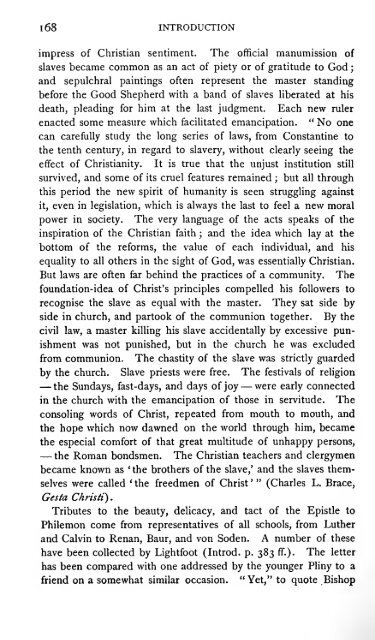Philippians and Philemon - MR Vincent - 1906.pdf
Philippians and Philemon - MR Vincent - 1906.pdf
Philippians and Philemon - MR Vincent - 1906.pdf
Create successful ePaper yourself
Turn your PDF publications into a flip-book with our unique Google optimized e-Paper software.
1 68 INTRODUCTION<br />
impress of Christian sentiment. The official manumission of<br />
slaves became common as an act of piety or of gratitude to God<br />
<strong>and</strong> sepulchral paintings often represent the master st<strong>and</strong>ing<br />
before the Good Shepherd with a b<strong>and</strong> of slaves liberated at his<br />
death, pleading for him at the last judgment. Each new ruler<br />
enacted some measure which facihtated emancipation. " No one<br />
can carefully study the long series of laws, from Constantine to<br />
the tenth century, in regard to slavery, without clearly seeing the<br />
effect of Christianity. It is true that the unjust institution still<br />
survived, <strong>and</strong> some of its cruel features remained ; but all through<br />
this period the new spirit of humanity is seen struggling against<br />
it, even in legislation, which is always the last to feel a new moral<br />
power in society. The very language of the acts speaks of the<br />
inspiration of the Christian faith ; <strong>and</strong> the idea which lay at the<br />
bottom of the reforms, the value of each individual, <strong>and</strong> his<br />
equality to all others in the sight of God, was essentially Christian.<br />
But laws are often far behind the practices of a community. The<br />
foundation-idea of Christ's principles compelled his followers to<br />
recognise the slave as equal with the master. They sat side by<br />
side in church, <strong>and</strong> partook of the communion together. By the<br />
civil law, a master killing his slave accidentally by excessive pun-<br />
ishment was not punished, but in the church he was excluded<br />
from communion. The chastity of the slave was strictly guarded<br />
by the church. Slave priests were free. The festivals of religion<br />
— the Sundays, fast-days, <strong>and</strong> days of joy—were early connected<br />
in the church with the emancipation of those in servitude. The<br />
consoling words of Christ, repeated from mouth to mouth, <strong>and</strong><br />
the hope which now dawned on the world through him, became<br />
the especial comfort of that great multitude of unhappy persons,<br />
— the Roman bondsmen. The Christian teachers <strong>and</strong> clergymen<br />
became known as ' the brothers of the slave,' <strong>and</strong> the slaves them-<br />
selves were called ' the freedmen of Christ ' " (Charles L. Brace,<br />
Gesta Christt).<br />
Tributes to the beauty, delicacy, <strong>and</strong> tact of the Epistle to<br />
<strong>Philemon</strong> come from representatives of all schools, from Luther<br />
<strong>and</strong> Calvin to Renan, Baur, <strong>and</strong> von Soden. A number of these<br />
have been collected by Lightfoot (Introd. p. 383 ff.). The letter<br />
has been compared with one addressed by the younger Pliny to a<br />
friend on a somewhat similar occasion. " Yet," to quote Bishop<br />
;





